GRAZED
By Officer (RET) Thadeu Holloway
*This is an article from the Spring 2023 issue of Combat Stress
According to the dictionary, “grazed means to scrape the skin from; abrade.” The bullet just grazed his shoulder. As a verb (used without object), grazed or grazing means to touch or rub something lightly, or so as to produce slight abrasion, in passing.
A lot of people think that on September 21st, 2021, I was “grazed” by a bullet. That couldn’t be farther from the truth. The truth is, I was shot in the head and by the grace of God, the bullet did not penetrate my skull. I will hate the word “grazed” until the day I die. 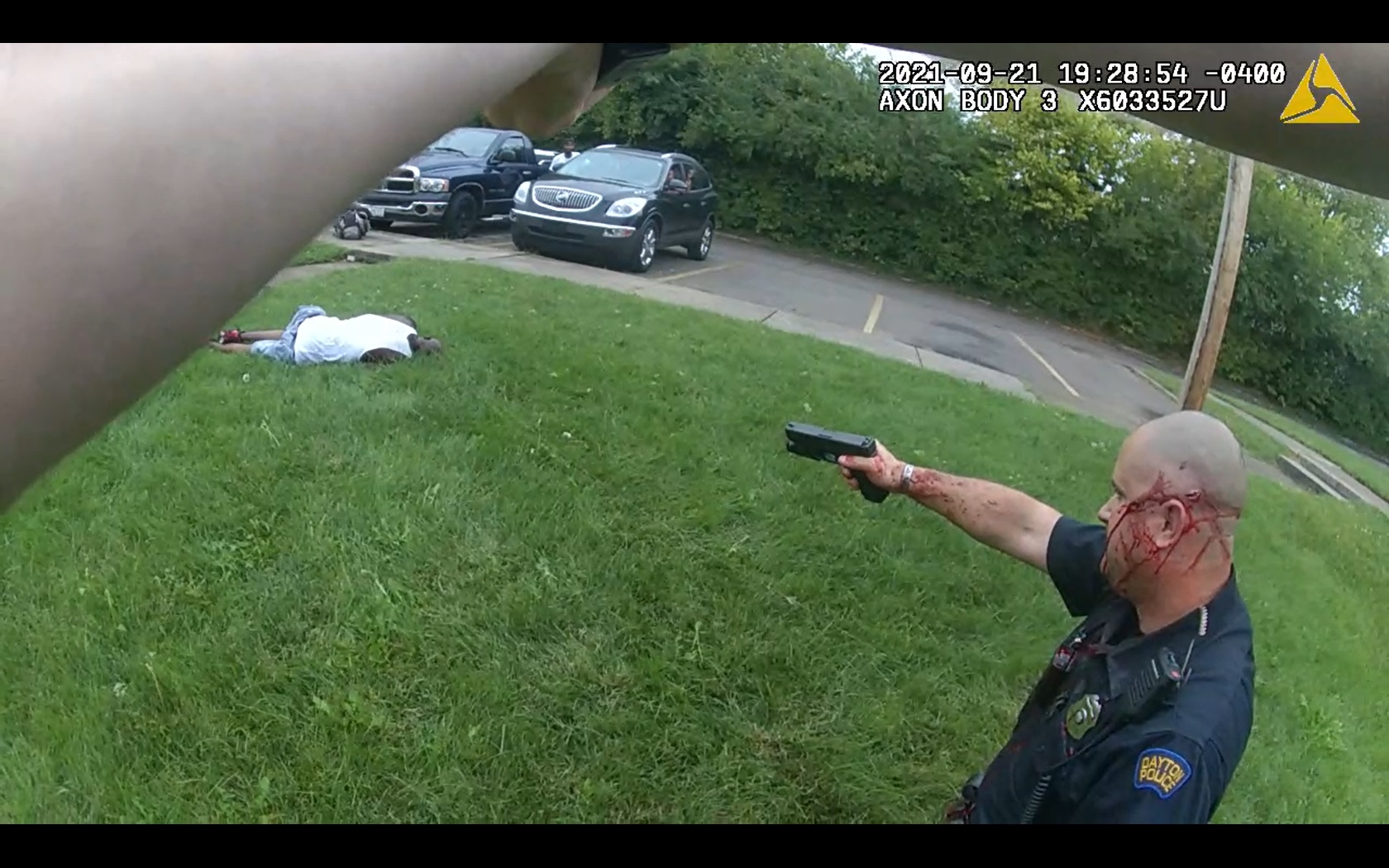
September 21, 2021, was my first day back to work after a rough battle with Covid. It was nice being back at work. I had been off for just over a month, between military training, my wife contracting Covid, and then getting Covid myself. It was nice being back and being with my co-workers, many of whom are good friends of mine. In addition, we had Sergeant Tom Cope covering our shift, since our normally scheduled sergeants were off that day. Sergeant Cope was a very down-to-earth kind of supervisor, who loved doing police work alongside his officers. There had been several shifts during which I was taking calls by myself, and Sergeant Cope would step up and take calls with me, just as if he was another regular street officer.
Roll call that day was very relaxed and with lots of laughs. We told a few stories about recent incidents, some of which resulted in uses of force. I brought up the fact that I had never had a successful deployment with my new Taser, the X26P. We had just received this taser within the last few years. I had been deployed overseas with the Ohio Army National Guard for part of that time. We joked about how I had almost tased one of our sergeants after returning from my deployment. This was because during our testing cycle of our taser, I had forgotten to remove the taser cartridge. I know…. rookie mistake. 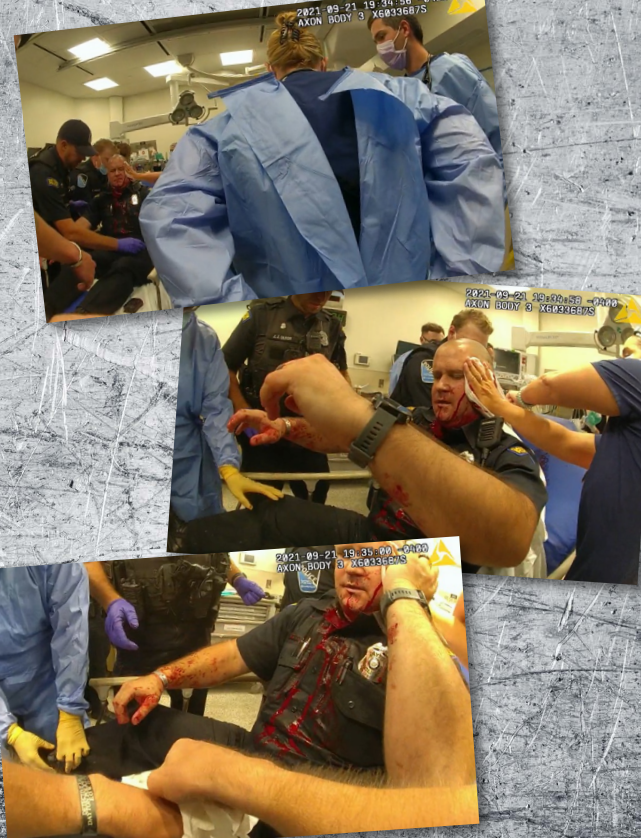
Following roll call, I took a few calls with Officer Riley Brown and Officer John Rice, who were a two-man crew, along with Sergeant Cope. The calls were pretty lame and involved nothing too serious. After we cleared up the higher priority calls, I decided to take a low priority fraud call. I didn’t want to get into anything too serious because I wasn’t sure I had fully recovered from Covid. It was supposed to be a very simple call; a typical “paper” call. 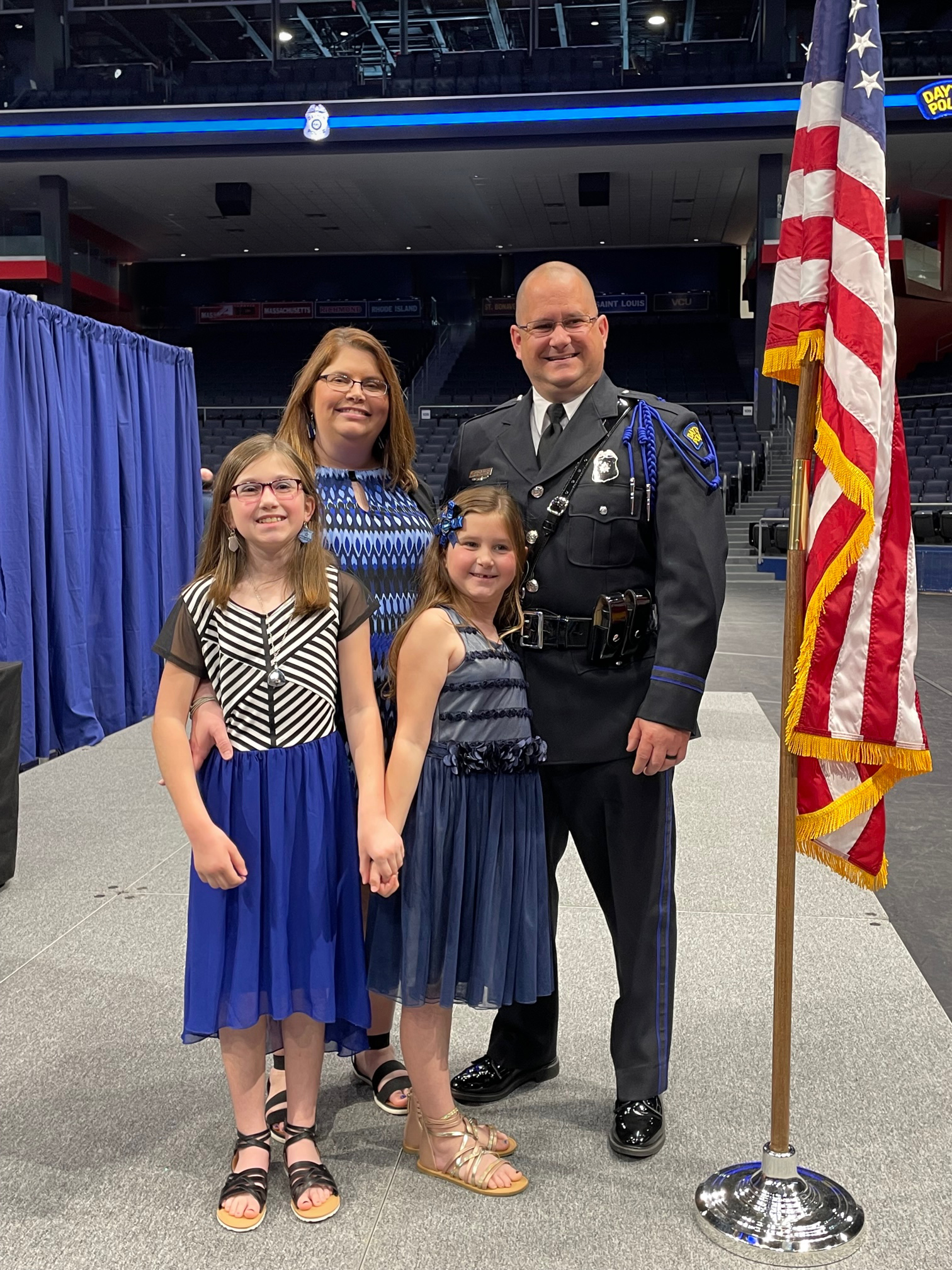
Office (RET) Thadeu Holloway and his family after receiving the Medal of Valor and the Blue Heart Medal from Dayton Police Department on April 29, 2022.
I made my way to one of our local Dollar General stores, where I made contact with the manager. He advised that someone had passed a fake hundred-dollar bill. When he questioned his employees about it, one of his employees stated that he remembered receiving the money. The manager was able to go back and look at the stores security camera and found video of the suspect. The manager showed me the video and I noticed that when the suspect had walked into the store, he had put a backpack down by the front door of the store. There was clear video of the suspect, and I was able to take a clear photo of the suspect in the video.
I took down all the information needed for my report, retrieved the fake money, and returned to my cruiser. I had recently made the decision that I was ready to apply to become a detective, so I decided to do a little investigating myself to try to identify the suspect. I remember how the suspect was dressed and the fact that he had a backpack with him when he entered the store. This is common practice in that particular area of Dayton and within the city for people who are homeless. I knew from past experience that there was a homeless shelter about half a mile down the road and decided to make contact with the shelter staff to see if they could help identify the suspect.
I made my way to the homeless shelter and made contact with some of the employees. They immediately recognized me from all the previous calls I’d responded to there. I showed them the picture of the suspect and they immediately recognized him. At first, they couldn’t remember his exact name, so we hung out and talked for a few minutes. After a time, one of the employees escorted me to the kitchen area so I could show other employees the picture. One of the employees was finally able to remember that the suspect’s name was Antwan Lowe. We made our way back to the front desk area and the employees were able to search their “big book” of people that had taken up residence at the shelter. They were actually able to give me Lowe’s Social Security Number. I pulled my phone out and used one of the law enforcement websites to look up Lowe’s information, along with a photo. This, of course, matched my suspect. I showed the picture of Lowe to the other shelter employees, and they also confirmed that this was indeed Antwan Lowe.
Feeling good about having found a name to go with the suspect, I decided to go back to the Dollar General store and show the online photo of the suspect to the store manager. He immediately verified that the picture on my phone was unquestionably the suspect that had passed the counterfeit money. As the manager and I continued to discuss this case, he told me that he didn’t wish to press charges at that time but requested that Lowe be trespassed from the store property.
I returned to my cruiser and ran Lowe’s information through LEADS (Law Enforcement Automated Data System) and found an address for him across the city. I had a feeling that the address in LEADS wasn’t a current address for him, so I decided to run his information through another online law enforcement website. I was able to locate the address of 617 Ingram Street which I knew was one of the neighborhoods behind the Dollar General Store. I had already spent about two and a half years working as a member of the Greater Dayton Premier Management (GDPM) Task Force. GDPM is a company that owns and operates numerous housing projects in and around the City of Dayton. They have a contract with the Dayton Police Department to have three officers assigned to the Task Force. The Task Force’s duties include, community engagement, calls for service, patrolling all GDPM properties, and investigation of anything from simple crimes to more in-depth crimes involving drugs, guns, and boot joints (illegal liquor establishments which usually lead to violent crimes).
Though 617 Ingram Street had not been a GDPM property, it was directly across the street from a GDPM property known as Hilltop Homes. I had spent a lot of time in and around Hilltop Homes and knew the area very well. I decided to go by the address to see if I could locate the suspect. I changed my location to 617 Ingram Street on my in-car computer and hit the “enroute” button, letting dispatch know that I was heading to a different location.
I arrived just south of the location and drove past the front of the residence, which was a row of apartments that were all connected. I did not see my suspect at that time but knew there was a parking lot behind all of the apartments. I decided that I would drive through the back parking lot. As I drove around the side of the apartment and entered the parking lot, I immediately noticed my suspect standing on the sidewalk directly behind his Ingram Street address. I pulled my cruiser into the center of the parking lot and parked. As I exited my cruiser, my suspect started walking towards an opening between two apartment buildings. I stated to him “Sir, come here for a second.” The suspect took a few more steps away from me and said “No, why?” As I was answering him, the suspect quickly turned around and put down his backpack. I knew something was wrong, but before I could react, the suspect punched me directly under my right eye. After punching me, he quickly turned around and attempted to flee but I was able to quickly draw my department-issued taser, pointed it at the suspect, and pulled the trigger. Luckily, both metal probes from the taser made contact with the suspect and he immediately fell to the ground.
I alerted dispatch that I was “fighting one” behind 609 Ingram Street. This would let other officers in the area know that I needed backup. I ordered the suspect numerous times to put his hands behind his back, but he refused. Instead, he was laying on his back and was rubbing his back on the ground as if trying to get the metal probes out. I again pulled the trigger on the taser and continued to give him commands to put his hands behind his back. The suspect then pulled out a red handkerchief out of the right front pocket of his shorts. He was able to get something black out of it, but I couldn’t tell what it was. It just looked black to me. All of a sudden, I heard a loud BANG and the next thing I knew, I was falling to the ground landing on my butt, my head in extreme pain. I started seeing blood everywhere. I knew what had just happened but couldn’t believe this was happening to me. How could a simple encounter, where the worst thing that was going to happen was someone getting trespassed from a business, result in my getting shot and not just shot, but shot in the head? I yelled out a very high pitched and very scared “F—K!!!!” 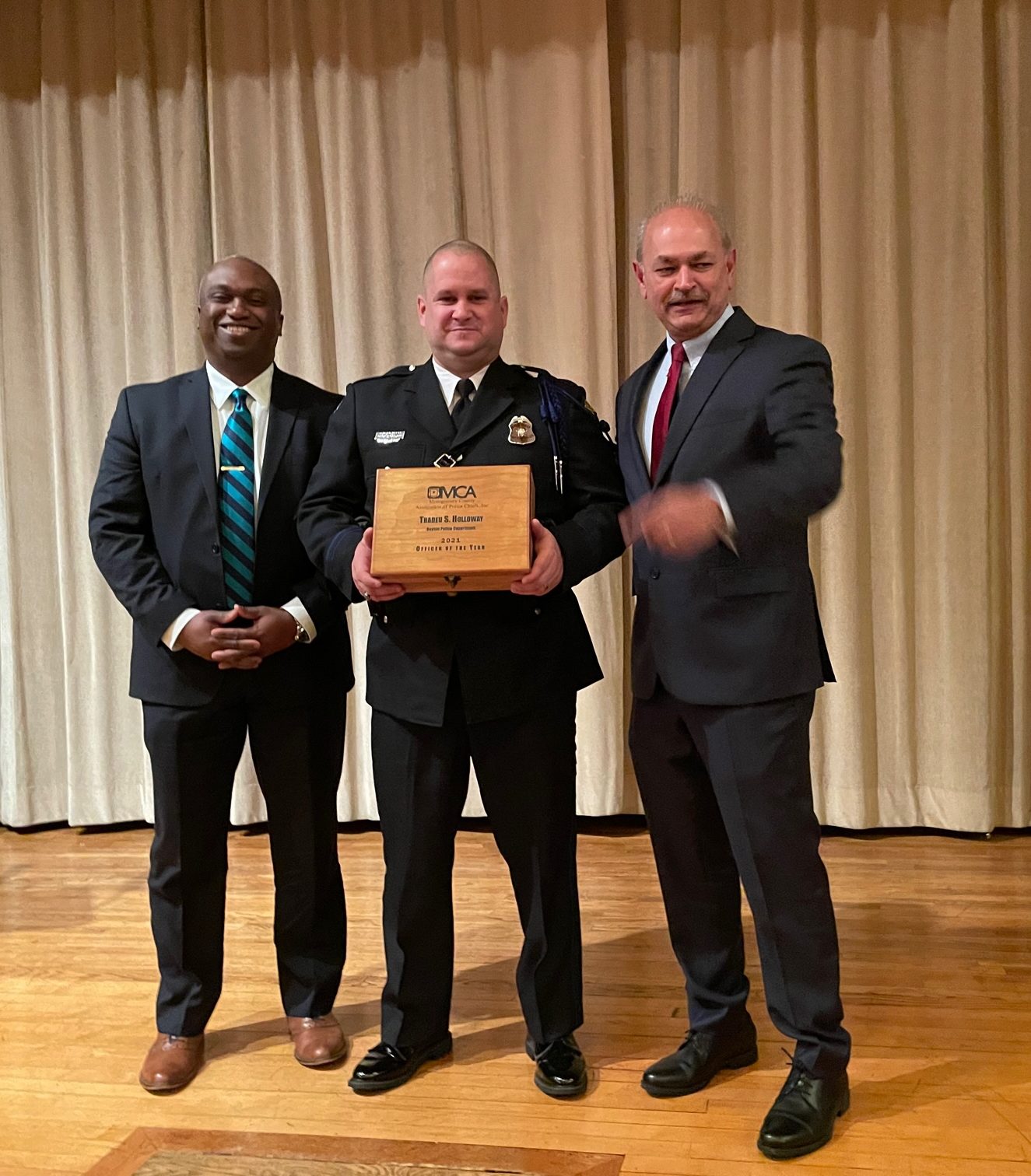
LTC Eric Henderson and Chief Kamran Afzal present the Montgomery Association of Chiefs of Police Officer of the Year Award to Officer Thadeu Holloway, January 2022
My years of military and police training kicked in and before I realized it, my gun was in my hand. I fired a round, then I fired two rounds and then two more again. It seemed to happen so quickly, but yet everything happened in slow motion. I got on the radio and said, “Shots fired, shots fired!” When a “shots fired” call goes over the radio, it’s serious…. very serious and often deadly. Police officers from surrounding jurisdictions respond to assist. I was able to get onto my knees and saw that I was bleeding profusely. Then the thought hit me, “I am going to die.” I realized I needed to let dispatch know that I had been shot before I lost conscious or even worse, died. I got back on the radio and said, “Dispatch I’ve been shot. Give me a medic.” As I waited for the dispatch to say something, I could hear the blood squirting out of my head. I could feel the blood dripping down my face, and I could taste the blood in my mouth. “Is this it?” “Am I going to die?” “Do I need to get on the radio and tell my family that I love them?” But I quickly got those ideas out of my head. I was still alive, and I wasn’t going to give up that easily. I wasn’t going to let the bad guy win! I was still alive and still had a job to do. I pointed my gun towards the suspect, who was laying mostly on his right side. I immediately realized that he still could pose a threat, as I did not know where his gun was and if he was dead or alive. As I pointed my gun towards the suspect, I had already made the decision that if he started to turn towards me, that I was going to shoot him again because he still posed a threat. I quickly prayed that he would just lay still and not turn towards me. As I kept my gun on the suspect, I knew that my adrenaline was in overdrive. I noticed that my hand was shaking, which was making my gun shake all over the place. I got on my radio again and advised dispatch “I’m behind 609 Ingram, I’ve been shot, I returned fire, I need medics and I need crews, please hurry!” I could faintly hear my radio and feared that my left ear might have been shot off. I later learned that when the bullet travelled under the skin, it had ripped my earpiece off. 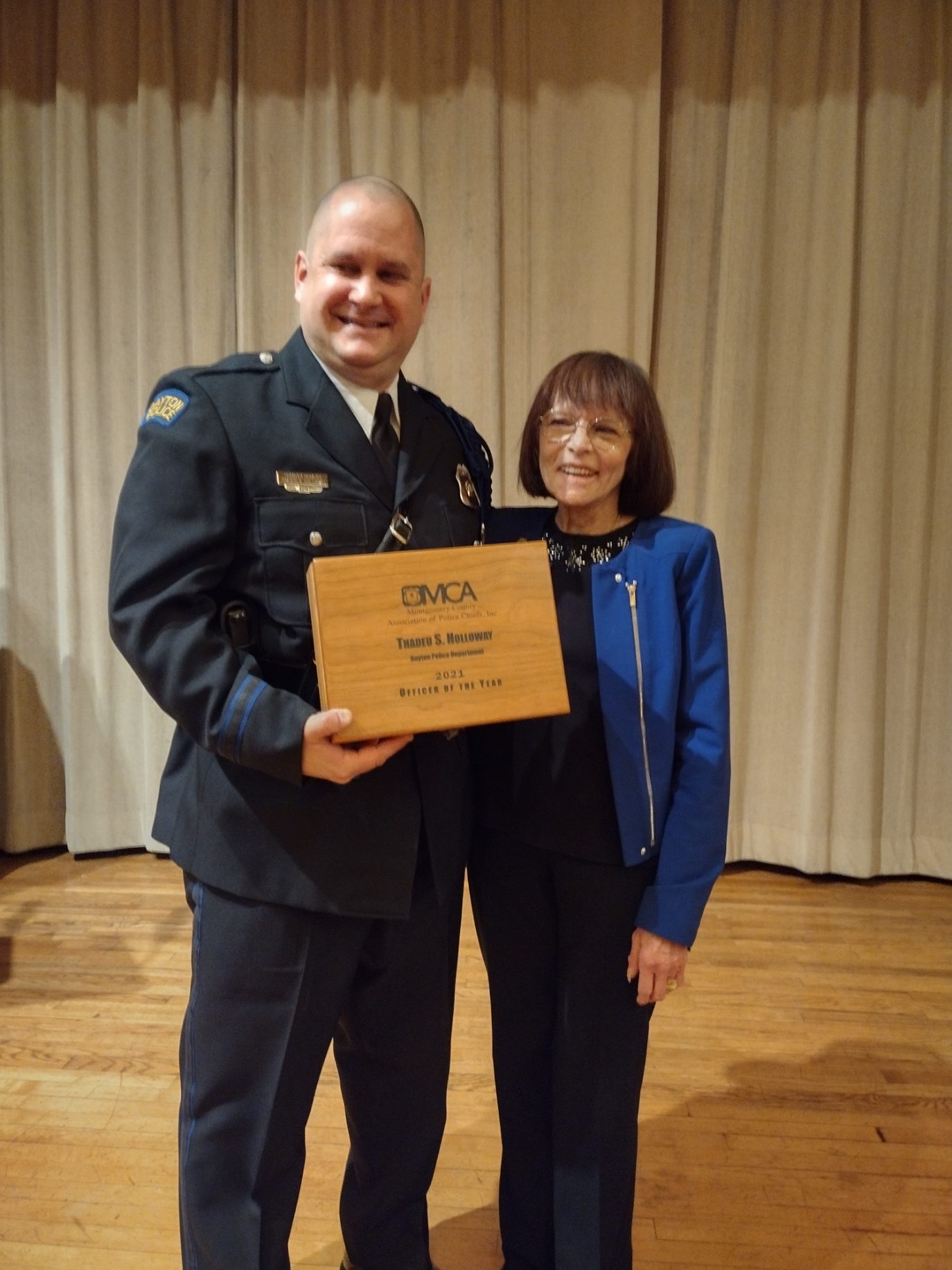
Officer (RET) Thadeu Holloway and COL (RET) Kathy Platoni.
As I waited for more police officers to arrive, I noticed that people were starting to come out from their apartments. Here I was, by myself, severely injured and surrounded by citizens. I feared the worst. In today’s environment, police officers are not very well liked, and it wouldn’t have taken much for someone to hurt me further since I was in no shape to defend myself. I quickly requested everyone to stay back. Surprisingly, everyone listened. Then a lady who had been sitting inside a SUV and witnessed the whole incident said, “He isn’t dead. He’s still breathing.” I told her that I had medics coming. 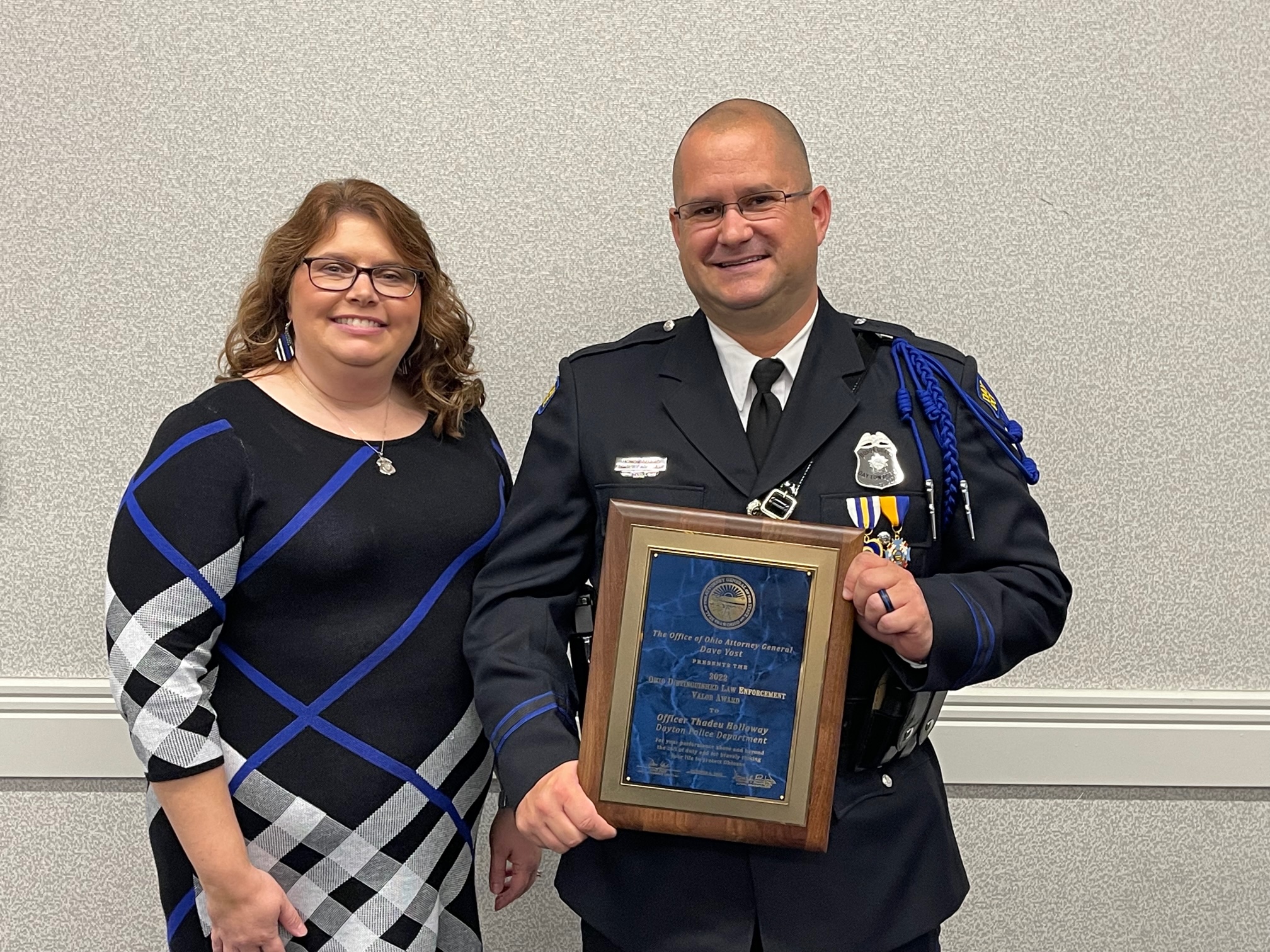
Officer Thadeu Holloway and his wife, Amanda after receiving the Ohio Distinguished Law Enforcement Valor Award from
the Ohio State Attorney General, Dave Yost on October 6, 2022
Then I heard our Field Lieutenant, Lt. Steve Clark get on the radio and say, “Talk to me crew.” I again advised, “I am behind 609 Ingram Street. Please hurry.” “I’ve been shot on the left side of my head. I can barely hear my earpiece.” I could hear sirens getting closer and closer and couldn’t wait until my back up arrived. It took the first officer, Officer Ederer, just under two minutes from the time I was shot to arriving on scene but that was the longest two minutes of my life.
As Officer Ederer exited his cruiser, I advised him that the suspect still had his weapon. Officer Ederer first asked if I was okay. At that moment, I really didn’t know. I knew that I was bleeding and bleeding a lot, but I didn’t know if I was going to remain conscious or if I would pass out and possibly die at any moment. So, I just replied with, “I don’t know.” Officer Ederer did what any officer would do and wanted to retrieve the suspect’s weapon and secure the suspect with handcuffs. I knew that I was in no condition to cover him while he retrieved the firearm and so I told him to wait until more crews arrived on scene.
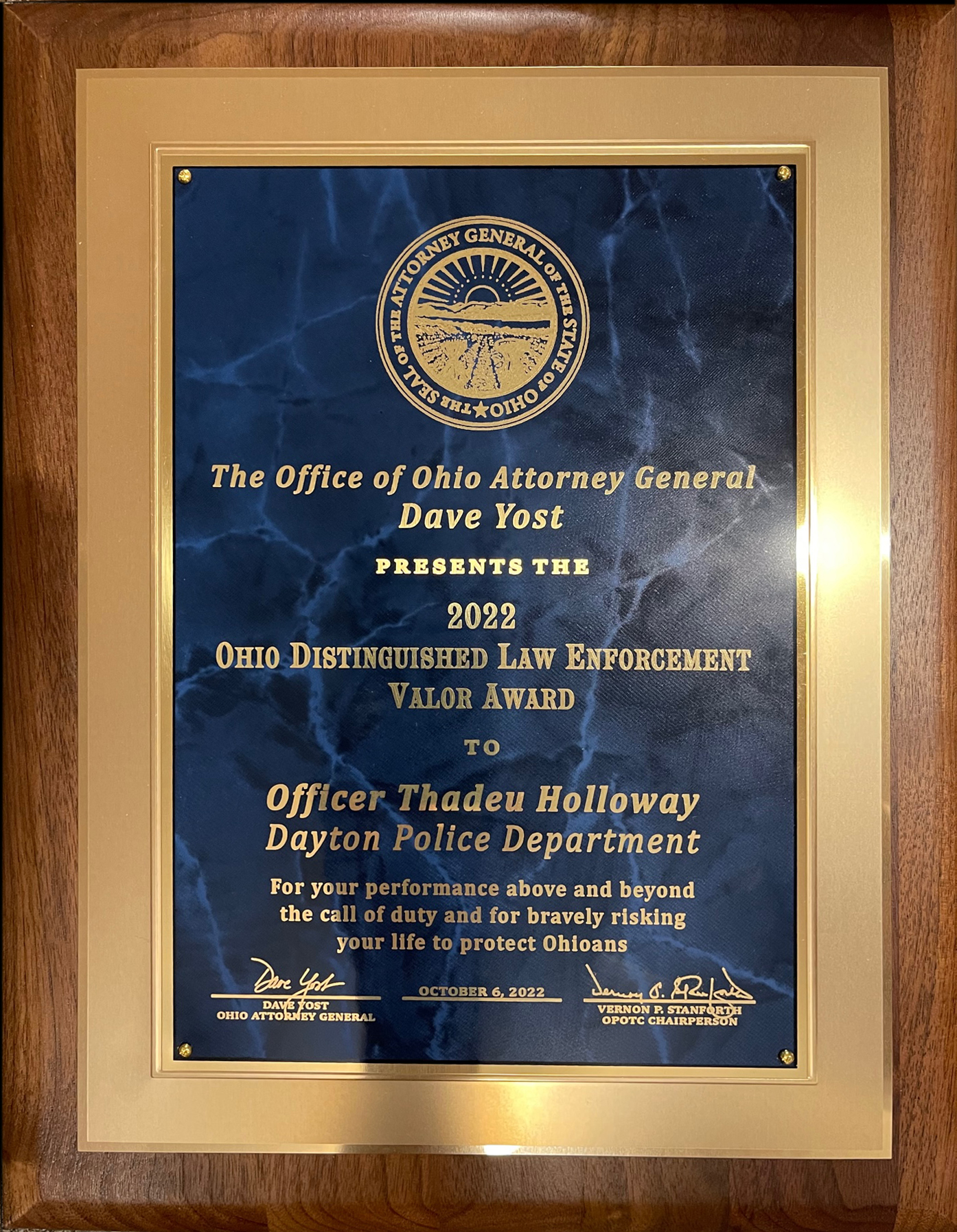
Knowing that Officer Ederer was now covering the suspect, I knew I could relax a little bit and breathe. I was still on my knees. I put my gun back in its holster and bent over with both of my hands touching the ground. This was a BIG mistake. As I did this, more blood ran down the center of my face and landed in the grass and on my hands, which were directly in front of me. This did little to make me feel any better. Just as I did this, I heard Lt. Clark get on the radio giving the instruction, “Crews, load him in your cruiser and go!” This meant that Officer Ederer was supposed to load me in his cruiser and rush me directly to the hospital, a level one trauma center. I knew that was the best thing I could do at that time, but if we both left, there would be no police officers to watch the suspect, no police officer to protect the civilians that were then streaming out of their apartments, no police officer to preserve the scene.
I told Officer Ederer, “NO! We are waiting for more crews.” Had this been a police officer who hadn’t just graduated the academy a few months prior to my shooting, I am sure that he would not have listened to me and would have forced me to leave. Luckily, Officer Ederer didn’t argue with me and so we waited for more crews to arrive on scene. 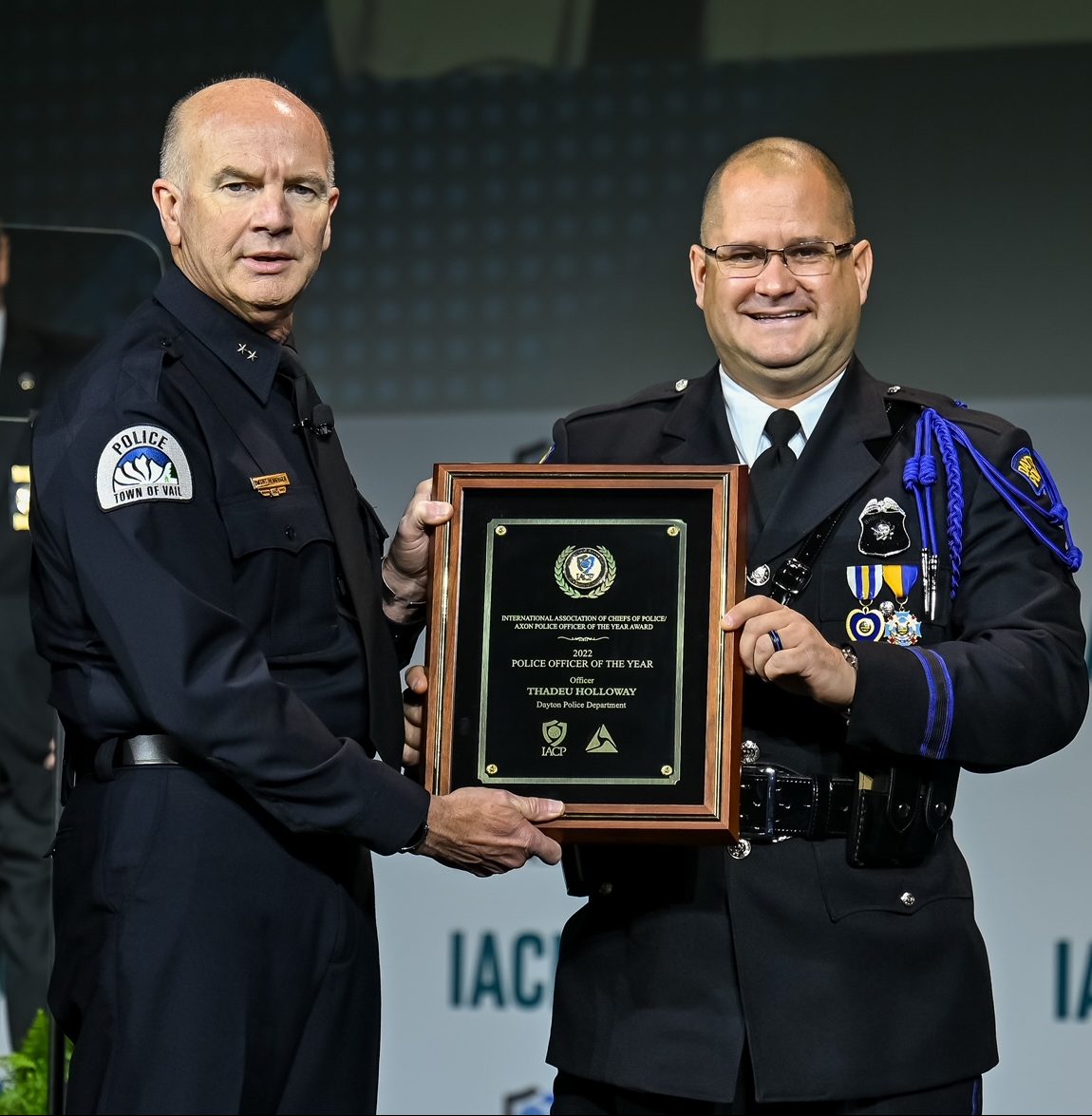
President of the International Association of Chiefs of Police presents the IACP/AXON Award to Officer Thadeu Holloway, October 17, 2022
Bystanders were now wondering when the medics were going to get there. They again advised me that the suspect was still breathing. I wanted to say, “Yeah no shit!” but I didn’t. I just advised them again that the medics were on their way.
Then I heard it! Sirens were coming from everywhere, all around us. I was never so thankful to hear so many sirens. Officer Darryl Letlow arrived first, with Lt. Clark right behind him. Officer Letlow had been a street cop for a very long time. He first worked as an Ohio State Highway Patrol Trooper and I had heard stories of how well he could drive. As Officer Letlow pulled up in the parking lot, Officer Ederer knew I needed to go to the hospital and ordered me to “just go.” Officer Letlow was at my side and pretty much dragged me to his cruiser before I could argue with anyone.
I quickly got in the back seat of Officer Letlow’s cruiser and made sure to put on my seatbelt. (I didn’t want Officer Letlow or me to receive a one-day suspension for me not wearing a seatbelt.) I could hear Officer Letlow get on the radio and ask dispatch to alert the hospital that we had an officer who had been shot. I held on for dear life as Officer Letlow drove to Miami Valley Hospital. He drove 3.7 miles, a trip that normally would take roughly 8 to 10 minutes, in three and a half minutes! Officer Letlow not only drove safely, but he also talked to me the entire drive to make sure that I stayed calm, alert and conscious. I could not have asked for a better person to have driven me to the hospital.
Once we arrived at the hospital, all hell broke loose. Everyone, and I mean everyone: doctors, nurses, police officers from Dayton Police Department, and police officers from Miami Valley Hospital were all trying to help. They all wanted to take care of me, but I could still take care of myself… well, kind of. As soon as the cruiser stopped and the door opened, there were all sorts of hands trying to get me out of the cruiser. I repeatedly told them, “I’m alright.” In reality, I wasn’t, but I wanted to do as much as I could. I got myself out of the cruiser and they already had a gurney waiting for me. Everyone was trying to get me to sit down on the gurney, but I was so overwhelmed with everyone there that I couldn’t even remember how to turn around and sit down. After a few seconds, I was finally able to get on the gurney with everyone surrounding me. There were so many people around me that we almost couldn’t get inside the doors to the hospital. As they wheeled me inside the hospital and then into the emergency room, I heard a nurse ask if someone could get my duty belt off. Of course, all the police officers that were surrounding me answered yes and jumped in to assist.
They got me inside one of the primary emergency rooms where they conduct emergency surgeries (trauma room). I had seen this room close to a thousand times. Whenever a shooting incident, serious car accident, or an overdose where the person might not survive, or any sort of serious or life-threatening injuries occurred, they would end up in that room. We would have to wait until the doctors could advise us as to how severe the injuries were or if the person was going to survive or not. Never did I picture myself being a patient in that room, let alone for a gunshot wound to the head.
As I entered the room, there were still hordes of people around me. Everyone was trying to help. I managed to undo my gun belt, which was then taken from me. Then my shirt came off and then my body armor was taken from me. All the while, I could hear a lot of familiar voices telling me that I was going to be okay. The next thing I knew, a strong hand was holding my left hand. They weren’t just holding it, but it felt like we were connected in a way that I will never be able to describe. It reassured me and got me to calm down a little bit. I looked up to realize that it was Officer Jack Miniard who was holding my hand. Officer Miniard and I had served in the National Guard together and were deployed together several times. A few years after being in the police department we became partners and rode together for almost two years. I had learned a lot from him, both good and bad. (We both got disciplined for having an illegal pursuit and had to serve a two-day suspension. We still laugh about this to this day).
After being in the room for about 30 seconds, the doctors and nurses couldn’t do their job properly because there were so many police officers in the room, surrounding rooms, and hallways. As much as they didn’t want to, the nurses told the police officers that they needed to leave the room. As the officers left, I felt so alone. Even though there were numerous doctors and nurses in the room, I still felt so very alone. I didn’t personally know any of the doctors or nurses. Sure, I’d seen them around when I was at the hospital, but it just wasn’t the same. I wanted to ask the nurse to allow Officer Miniard to stay in the room, but I knew they had a job to do. Just before they closed the curtain to my room, I was able to see that there were roughly 15 to 20 police officers hovering right outside my room.
From that point on I remember being poked and prodded and moved all around. I remember someone quickly stitching up my head to get the bleeding to stop. The doctor even stated, “This isn’t going to be pretty, but it will stop the bleeding.” Then it hit me. My family was about to be notified that I had just been shot. I started to cry because I knew this would be news that no police officer’s family ever wanted to hear. I started to imagine how scared my wife and two daughters would be. I wanted to call my wife, but my phone had been taken from me. None of the doctors or nurses knew my wife in such a way that they could call her and give her that kind of news. I wanted Officer Miniard back in my room, but he was gone. I knew the department would take care of notifying her, but I wanted her to know that I was okay and that I was alive and talking in order to reassure her that I was receiving the necessary care.
After the doctors had stitched me up and hooked me up to IV’s and did what they could at the moment to make sure I was going to survive, they all left the room. Later, I would find out that the suspect had arrived at the hospital, and he was in much worse shape than I was. The doctors had gone to the trauma room next to mine and started to work on him. By that time, I had company again; a couple of nurses and the pastor that had just walked in. He walked up to my bed and asked if he could pray with me. Of course, I wasn’t going to say no, but this made me really scared. How bad was my situation that he felt that he needed to pray for me? Was he about to read me my last rights? He prayed for me and then left the room. I must have looked really scared because one of the nurses came over to me and held my hand. She stayed with me and kept reassuring me that I was going to be okay. She held my hand until my wife arrived sometime later. I would later find out that the nurse who held my hand and stayed with me, Jessica Cremeans, was the daughter of our district coordinator. He is the civilian who takes care of all of our police cruisers, making sure we have all the supplies we need to do our jobs.
I had been in the room for some time when my wife arrived with some of her closest friends. I immediately started crying because I was so thankful to see her. I looked up to see her and reached out to hold her. For the next hour or so, my wife stayed by my side as the doctors came and went.
I was then transported to an operating room for a left temporal artery surgical repair. I remember Officer Miniard and Officer Garrison escorting me and the nurses to the operating room. As we entered the OR, both officers tried to go in, but were not allowed by the staff. They were advised they had to stay outside. Again, my friend, Officer Miniard had to leave my side. I knew I was in good hands, but I was still extremely nervous. I was only in the room for a couple of minutes when they put the mask over my face. Within seconds, I was out.
I don’t remember waking up after my surgery in the recovery room, but apparently I was not very kind to the nursing staff. I was told that the nurses had to observe me for a short time until I was allowed to be taken to my room. As I later learned, part of the waking up process from surgery is that one must be able to speak to the nurses. Well, I refused. I’m sure this wasn’t on purpose and I’m sure I was confused. I don’t trust people easily to begin with and I’m sure I was very cautious when I woke up.
The first thing I remember after surgery was being in the ICU. I remember that my wife was by my side, but she was getting ready to leave. She needed to get back home to try to get a little bit of sleep before having to get two daughters up for school. I’m sure our daughters would have been really scared if they had woken up to find that both their mom and dad had not returned from the hospital. I kissed my wife goodbye and she promised to be back as soon as she got the girls on the bus. After she left, I went back to sleep.
I woke up somewhere around 5:30 AM (I think). A nurse was in my room and advised me that if I needed anything, I should tell the officer outside my room. What? Why was there an officer outside my room? What the hell had happened? What had I done wrong that required a police officer to stand guard outside my room? I was scared and my mind was racing a hundred miles a minute, rethinking about the incident from the previous night.
After a few minutes of thinking about the incident, a very welcome surprise happened. One of my Soldiers, Sergeant Ellis, who I had known for years and who had just recently deployed to the Middle East, showed up to my room. Sergeant Ellis was a youth pastor on the civilian side and had been our non-official pastor for our platoon while we were deployed. He was extremely religious but would never preach at you. He never forced religion upon anyone but would talk about religion if you so desired. Everyone who knew him respected him and could easily talk to him. And on top of all that, he had been one of my best NCO’s during our deployment to Kuwait and Saudi Arabia from 2019 through 2020.
Sergeant Ellis lived three hours away and I did not expect him to show up, let alone at this early in the morning. We sat and talked for a bit, but I couldn’t tell you much of what we talked about. I do remember asking him how he found out about my getting shot. He said that he was contacted by a mutual friend who we had both served in the National Guard. I’m sure I was still out of it and not making a whole lot of sense. Sergeant Ellis didn’t stay very long, but the fact that he had shown up and prayed for me before he left, made me very relaxed.
I was able to talk to Officer Hines, the officer that had been standing guard outside of my room. I did not know Officer Hines very well, as we had worked in different areas of the city and had never taken any calls together. Once he advised me that he was just there to guard me and that I would have a guard around the clock just for my safety, I was much more comfortable. I laid back down on my bed and was in and out of sleep the rest of the morning. 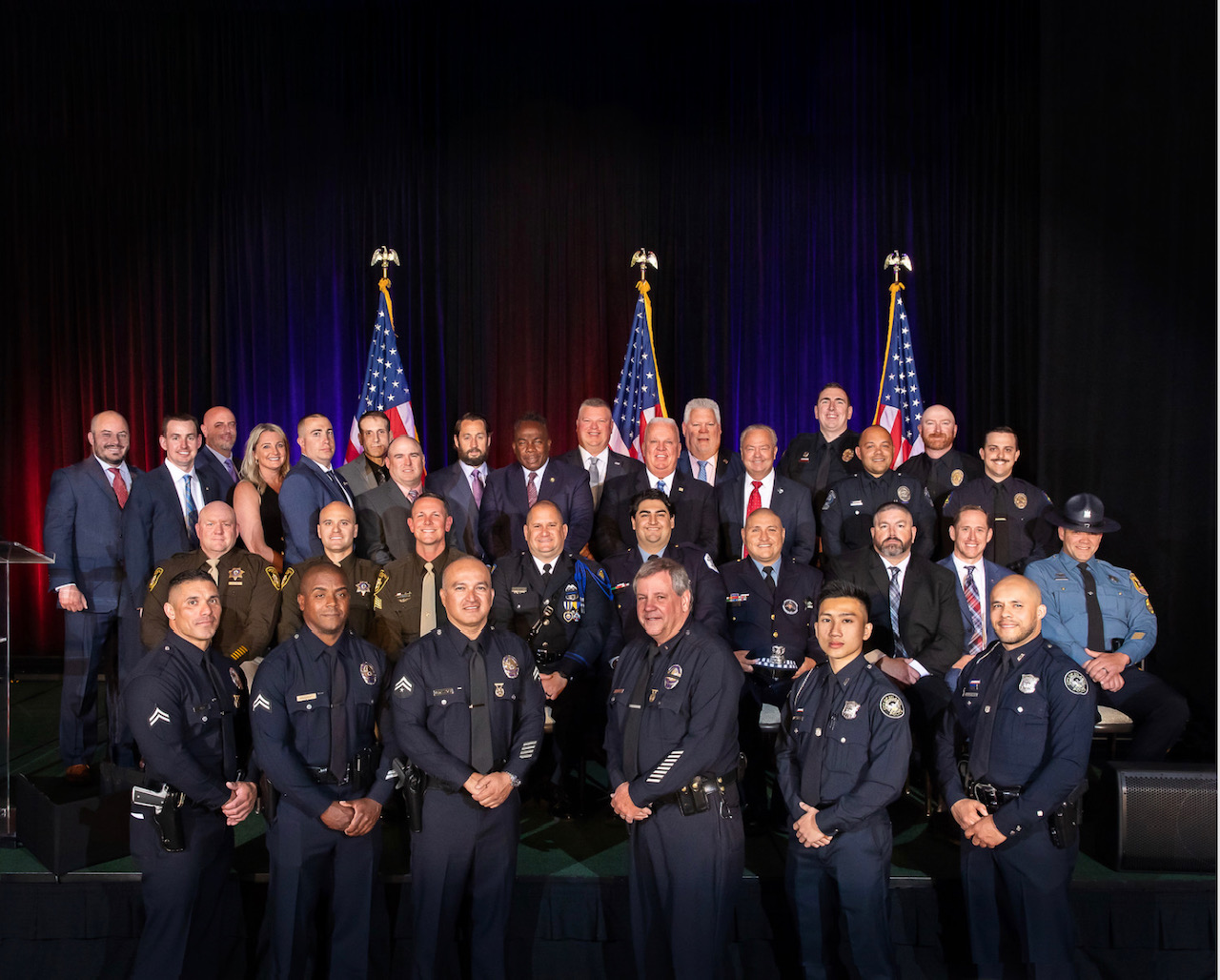
Top Cop Award 2022 Officer Recipients and Top Cop Board Members, May, 2022.
Amanda, my wife, showed back up around 9:30 AM and stayed with me the rest of the day. The remainder of my time at the hospital consisted of nurses and doctors checking on me every so often and sleeping here and there. I couldn’t get a good sleep because my head hurt so badly and I kept getting woken up. I would try to talk to the officers guarding me and invite them into my room, but I think most of them were uncomfortable with the situation and didn’t want to intrude on my privacy.
I had gotten to the hospital on a Tuesday night and by Thursday morning, I was ready to bust out. I told the doctors that I was going to escape if they didn’t release me. After much discussion, they agreed, but I waited and waited and waited for what seemed like forever. Little did I know that the reason I was delayed was because police officers from Dayton and surrounding jurisdictions were gathering outside the hospital. I was so completely overwhelmed when I got outside and saw all those police officers standing there just for me. After hugging or shaking hands with every single one of them, we got a police escort home. 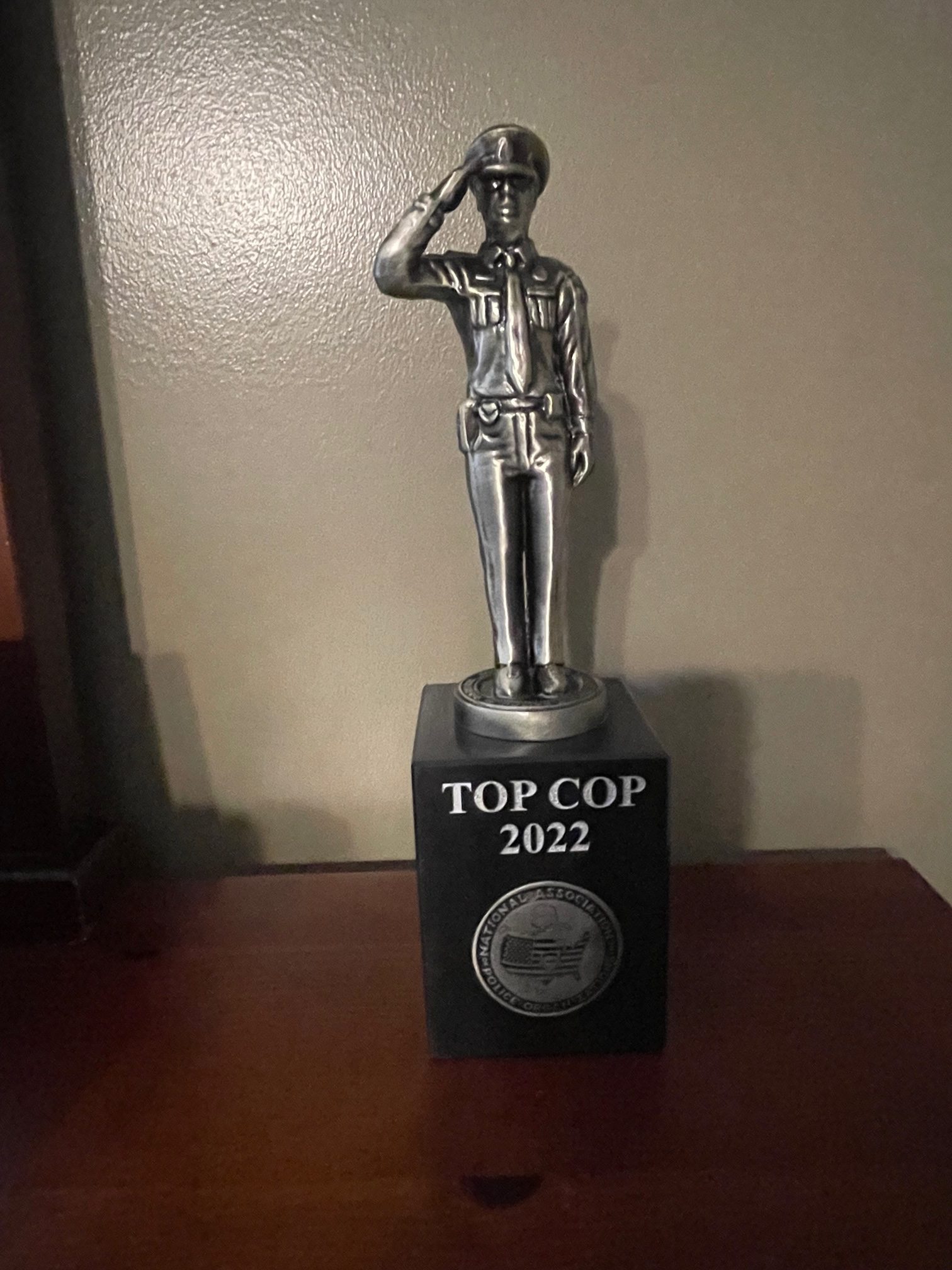
I got home and couldn’t have been happier. I wanted to go to my kids’ school and get them out of school early, but I knew I had to wait. I sat on the couch and stayed there just thinking how glad I was to be home and how lucky I was to be able to be home. Never did I think I would be shot in the line of duty, but to survive getting shot in the head was truly a miracle.
My kids arrived home a few hours after I did, and they were so excited to see me. I hugged them for a long time and didn’t want to let go. Once we were done hugging, both of my kids took a long look at my injuries and started to be a little scared. They weren’t scared of me, but how I looked. I was just glad that they didn’t have to see the initial stitches I received at the hospital. 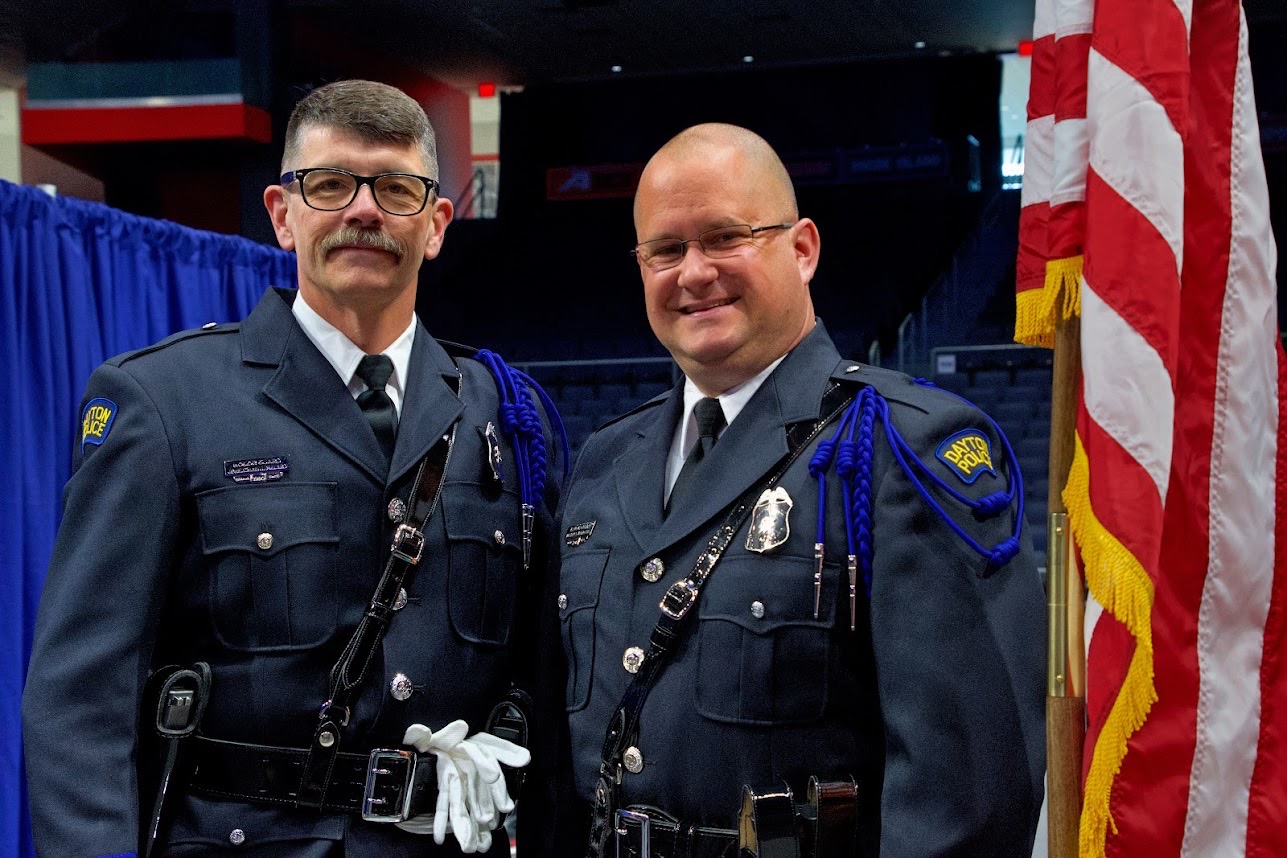
Officer Jack Miniard and Officer (RET) Thadeu Holloway at the Dayton Police Awards Ceremony on April 29, 2022.
When it was time to go to sleep, I knew that I couldn’t lay down in my bed. I decided to sleep on the couch where I could halfway sit up and put most of the weight on the back side of my head. I was able to get a few hours of good sleep because I was so tired. I was just glad to be home and not being awakened every couple of hours by hospital staff. I had to keep changing positions, because no matter what position I laid my head, it started to hurt.
Then the next day, I spent a lot of time responding to messages sent from fellow officers from all over the area. I also had to make some phones calls, especially to my military leadership to make sure they were aware of what had occurred. I also had to inform them that I would not be able to attend a military school that I was scheduled to go to about a month after my shooting. My head started to hurt more and more and by the time it was time to go to bed, I was in a significant amount of pain. I decided to take a Percocet that had been prescribed. Again, I was able to fall asleep, just because I was home and was still so tired. 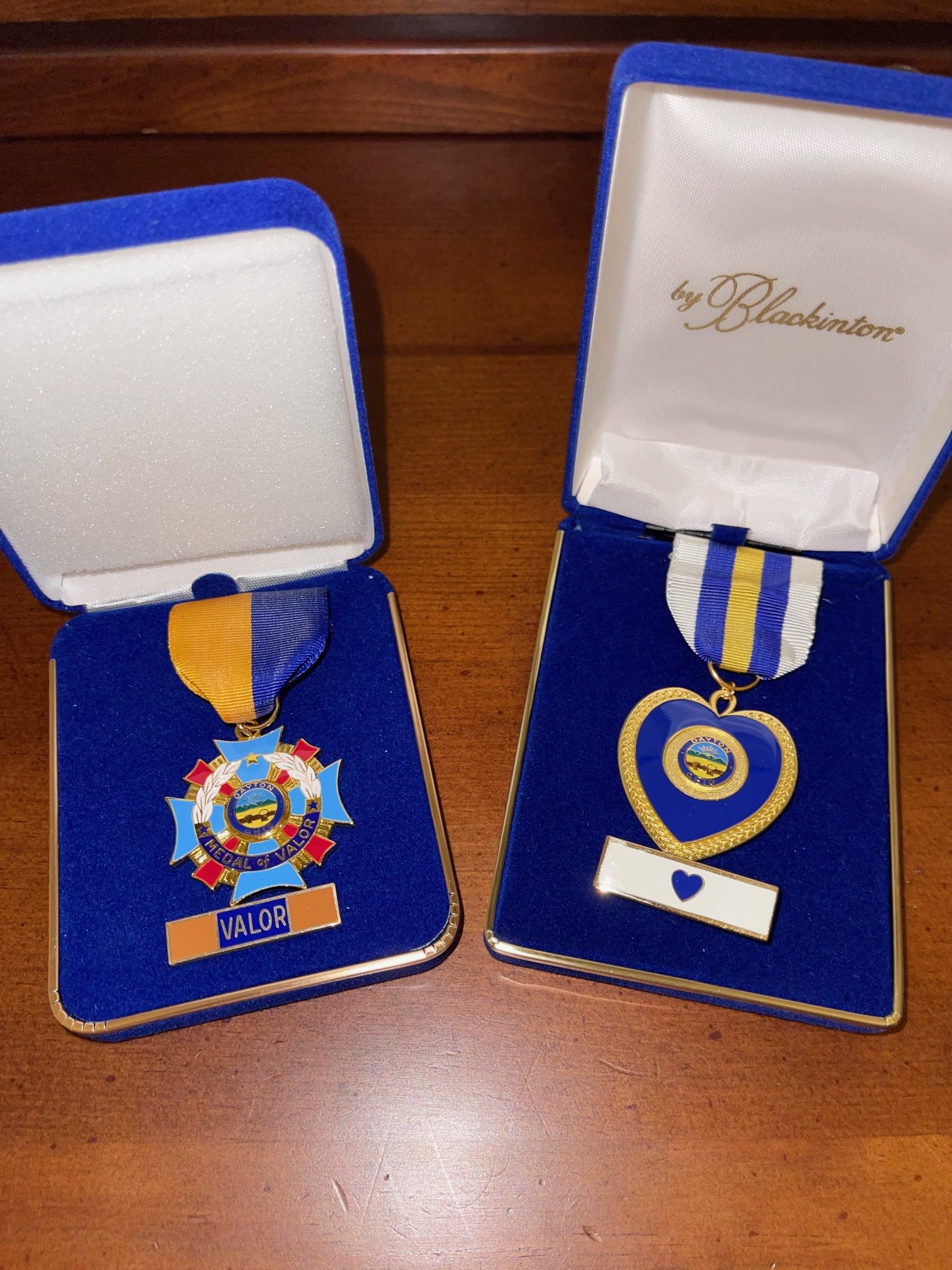
Officer Holloway received the Dayton Police Department Medal of Valor and the Blue Heart Medal.
I realized the hard way that my body did not like Percocet. I woke up in the middle of the night and started vomiting. Don’t get me wrong, I have puked plenty of times in my life, but I had never hurt so much while puking. I honestly felt like my head was about to explode. I continued to puke for about half an hour and every time I would puke, my head would hurt worst than the time before. I thought for sure that I was going to pop my stiches and would end up having to have emergency surgery again. I tried to stay quiet while vomiting because I didn’t want to wake up my wife or my kids. I was in so much pain, that I felt like I had been shot in the side of the head all over again. As I laid back down, I knew that I should probably wake my wife up to keep an eye on me, but I was stubborn and decided to suffer alone. I didn’t want my family to see me this way and to be even more worried about me.
I was able to get a little bit of sleep, but it wasn’t great sleep. For the next week, my head just hurt. I couldn’t do anything because I was in so much pain. We contacted the neurologist that I had seen at the hospital and was able to get an appointment scheduled for Friday, about a week and a half after my shooting. He first wanted me to get another scan done on my head. It wasn’t until I met with my brand-new family doctor that I was told of why I was in so much pain. She took the time to listen to me and to look into all the medical paperwork that was online. She explained to me that there was swelling on the inside of my skull that was pushing against my skull itself and against the actual location where I had been shot. She explained that it would take time for the swelling to go down and for the pain to resolve. It made sense once she told me this, but I was frustrated that a neurologist, a head/brain doctor couldn’t explain this to me. Little did I know that this was just the start of a long road of bad to terrible medical care that I would receive.
I continued to have doctor’s appointments here and there. Three months after my shooting, my neurologist wanted me to see a concussion specialist. He referred me to a concussion clinic that didn’t exist, and it took my wife and I two days of phone calls and running around to find this out. The neurologist then referred me to the University of Cincinnati Hospital Concussion Clinic, but because this was a work-related injury, we had to wait for BWC (Bureau of Workman’s Compensation) to approve it. I had already been warned that BWC denies everything, but I knew that my shooting was caught on body camera video and had been all over the news. But sure enough, BWC denied my referral, stating that I hadn’t complained of any head pain after my shooting. I was furious, I was pissed, and I wanted to yell and scream at the doctor who had made that determination. Looking back at it now, I would have to say that this was what started my severe depression and PTSD. I couldn’t believe they had denied me the help that I needed. Luckily, I had already contacted a lawyer prior to the denial and his office was already working on appealing the doctor’s decision. 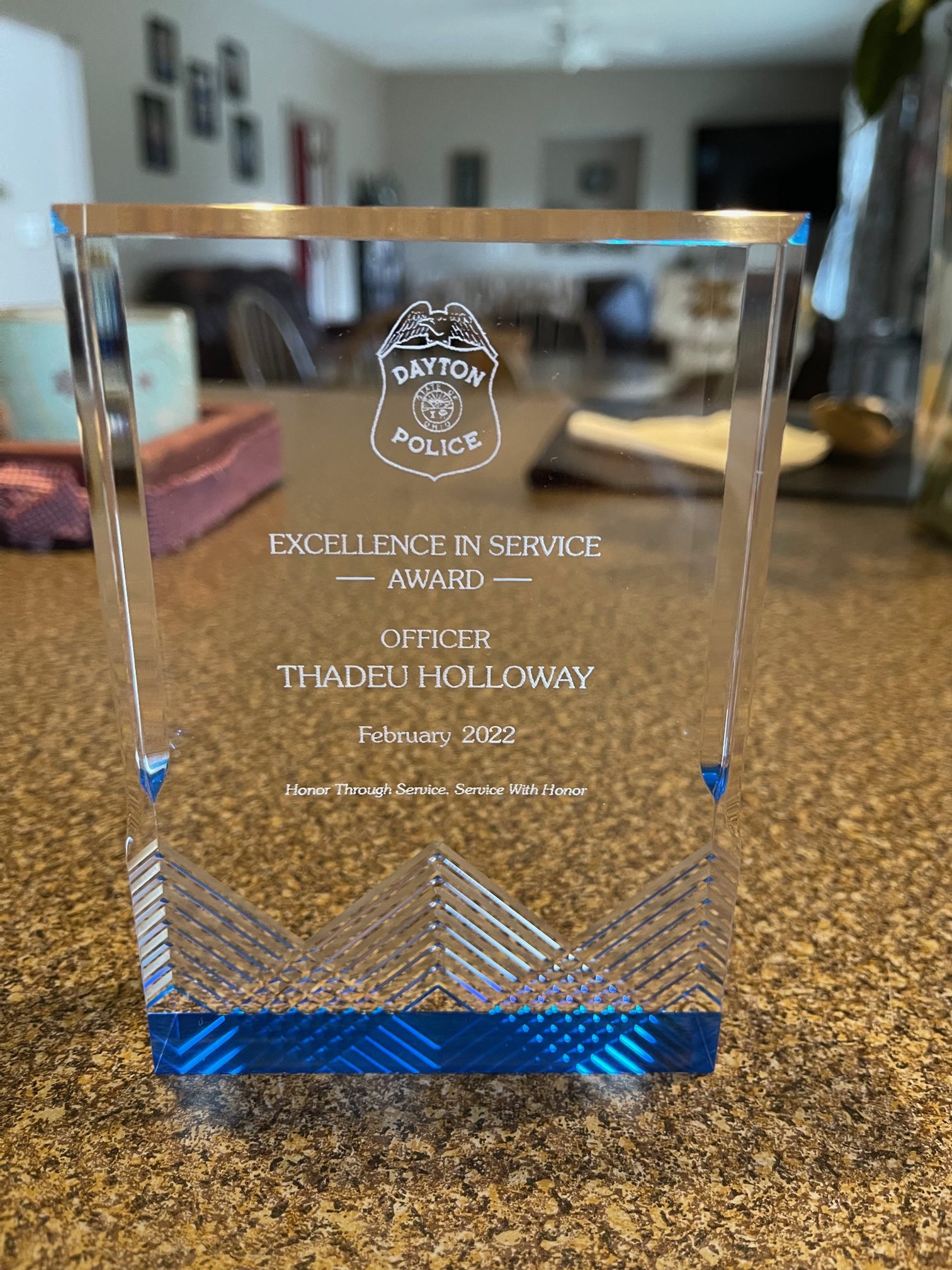
Officer Holloway received the Dayton Police Department Medal of Valor and the Blue Heart Medal
Like I said, this was just the start of denials by BWC. They would deny a shoulder injury I sustained when I fell to the ground. They denied my hearing loss and tinnitus. The reviewing doctor even wrote that there was no proof that I had returned fire at the suspect. This got so bad that I saw the same appeals officer several times and he told me the following: “I know we’ve heard your case before, but you have to treat this as if I have never seen you before.” So, I had to repeat a terrible ordeal numerous times, making me relive getting shot, just so I could get the proper medical treatment. Thankfully, I won all of my appeals, but this caused months of delays in getting the medical treatment I needed.
Thankfully, there were some really good highlights after I was shot. About a week and a half after my shooting, I received a personal invitation to have a meet and greet with the Secretary of Homeland Security, Secretary Mayorkas. I know there is a lot of controversy regarding Secretary Mayorkas, but the fact that he wanted to meet me while he was in Dayton was really incredible.
In January of 2022, I was invited to an awards dinner with the Montgomery County Association of Police Chiefs, winning the award for Officer of the Year. In April of 2022, I won the Medal of Valor and the Blue Heart Award from the Dayton Police Department. In May of 2022, I received the TOP COPS award from the National Association of Police Organization and the Citizens Choice Award. In October of 2022, I won the International Association of Chiefs of Police Officer of the Year Award.
Sadly, four days after winning my last award, I had to take a medical retirement. I had been advised by numerous people I highly trusted to talk to a disability lawyer, just in case I didn’t heal completely. Well sure enough, I noticed that I wasn’t healing fast enough and not anywhere close to where I needed to be in order to return to duty. I initially had a lot of issues with light sensitivity, noise sensitivity, would fatigue easily, and suffered from memory loss and word finding difficulties. My symptoms got better as time went on, but I had to make the hard decision to retire because I wasn’t back to my old self; not anywhere close. I was (and as I write this, still am) still suffering from severe depression and moderate PTSD. I knew that if I returned to work, I would be a huge liability to the community. More importantly, I would place the officers around me at unnecessary risk. It also scared me that one more blow to the head would cause me to have huge setbacks.
I am thankful for those that checked on me right after my shooting and to those who continued to check on me as time went on. There is a huge thank you for my family for their love and support, especially during those times when I am not the nicest person to be around. A special thank you to my good friend Dr. Kathy Platoni, who continues to help me mentally through all of this. She has been one of my biggest advocates from the very beginning. My battles and struggles and this difficult journey are far from over, but I will adapt and overcome them with a whole lot of help from the many people who love and care for me.
ABOUT THE AUTHOR
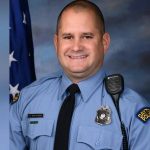
Retired Officer Thadeu (Ta-De-u) Holloway was a member of the 101st Dayton Police Academy Class and graduated from the academy in April of 2013. Prior to joining the Dayton Police Department, Officer Holloway attended Sinclair’s Criminal Justice Program and Sinclair’s Police Academy.
While serving with the Dayton Police Department, Officer Holloway was assigned to the Dayton Police Department’s Honor Guard, where he honored Dayton Officers who had served honorably. He also served with the Greater Dayton Premier Management Taskforce for several years. In November of 2018, he became certified in the Pursuit Intervention Technique and enjoyed it so much, that he became certified as a Pursuit Intervention Technique Instructor. He was also certified in Bike Patrol Operations and as a Patrol Training Officer.
Officer Holloway served in the Ohio Army National Guard for twenty years and recently retired at the rank of Sergeant First Class. While in the military, he was deployed five times. He deployed to Kosovo in 2004, to Iraq in 2006 and 2009, and to Kuwait and Saudi Arabia from 2019 through 2020. He was also deployed to provide aid in the aftermath of Hurricanes Katrina and Rita in the Gulf of Mexico. While serving in the National Guard, he received numerous awards, to include four Army Commendation Medals, one of which was for saving a Soldier’s life during a real-world life emergency.
During his ten years of service with the Dayton Police Department, Officer Holloway earned the Dayton Police Department’s Blue Heart Award and Medal of Valor Award, along with numerous Department Citations. He was awarded Officer of the Year by the Montgomery County Association of Police Chiefs in January of 2022. In February of 2022, he earned the Service in Excellence Award, which was presented to him by Chief Afzal during a City Council meeting. In May of 2022, he, along with 10 groups of Officers from across the nation, was awarded the national TOP COP Award by the National Association of Police Organizations in Washington D.C. From those ten cases, Officer Holloway was selected as the Citizens Choice Award. In October of 2022, Officer Holloway was nominated and won Officer of the Year from AXON/International Association of Chiefs of Police in Dallas Texas. This represents police chiefs not only from across the nation, but also internationally.
Sadly, Officer Holloway was forced to take a medical retirement five days after receiving his last award. The injuries he sustained during an officer involved shooting were too severe and wouldn’t allow him to return as a full duty police officer. Officer Holloway is married to his beautiful and very supportive wife, Amanda. They have two beautiful daughters, Addison and Olivia.
Combat Stress Magazine
Combat Stress magazine is written with our military Service Members, Veterans, first responders, and their families in mind. We want all of our members and guests to find contentment in their lives by learning about stress management and finding what works best for each of them. Stress is unavoidable and comes in many shapes and sizes. It can even be considered a part of who we are. Being in a state of peaceful happiness may seem like a lofty goal but harnessing your stress in a positive way makes it obtainable. Serving in the military or being a police officer, firefighter or paramedic brings unique challenges and some extraordinarily bad days. The American Institute of Stress is dedicated to helping you, our Heroes and their families, cope with and heal your mind and body from the stress associated with your careers and sacrifices.

Leave A Comment
You must be logged in to post a comment.